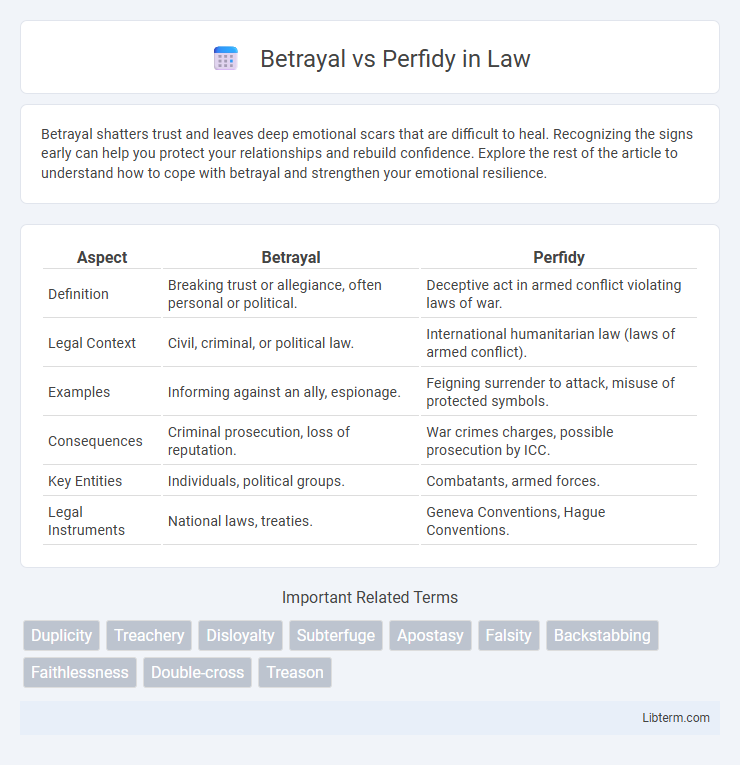Betrayal shatters trust and leaves deep emotional scars that are difficult to heal. Recognizing the signs early can help you protect your relationships and rebuild confidence. Explore the rest of the article to understand how to cope with betrayal and strengthen your emotional resilience.
Table of Comparison
| Aspect | Betrayal | Perfidy |
|---|---|---|
| Definition | Breaking trust or allegiance, often personal or political. | Deceptive act in armed conflict violating laws of war. |
| Legal Context | Civil, criminal, or political law. | International humanitarian law (laws of armed conflict). |
| Examples | Informing against an ally, espionage. | Feigning surrender to attack, misuse of protected symbols. |
| Consequences | Criminal prosecution, loss of reputation. | War crimes charges, possible prosecution by ICC. |
| Key Entities | Individuals, political groups. | Combatants, armed forces. |
| Legal Instruments | National laws, treaties. | Geneva Conventions, Hague Conventions. |
Understanding Betrayal: Definition and Origins
Betrayal involves the violation of trust through deceptive actions or disloyalty, often rooted in personal relationships or social contracts. Its origins trace back to ancient human interactions where loyalty was pivotal for group survival, making betrayal a profound breach with significant emotional and social consequences. Understanding betrayal requires recognizing its impact on trust dynamics and its role in shaping moral and ethical boundaries across cultures.
Perfidy Explained: Legal and Moral Perspectives
Perfidy involves deceptive acts during armed conflict that betray an adversary's trust, such as feigning surrender to lure enemy forces into a trap, violating international humanitarian law under the Geneva Conventions. Legally, perfidy is condemned because it undermines the principles of distinction and good faith essential to lawful warfare, constituting a war crime with accountability under international tribunals. Morally, perfidy erodes the ethical basis of combatant conduct by exploiting protected symbols or acts, damaging mutual respect between belligerents and jeopardizing the safety of those entitled to protection.
Historical Examples of Betrayal and Perfidy
Betrayal and perfidy have marked pivotal moments in history, each carrying distinct legal and moral implications; the Trojan Horse is a classic example of betrayal, where Greek soldiers deceived Troy by hiding inside a wooden horse, leading to the city's fall. In contrast, perfidy involves violating trust during armed conflict, such as feigning surrender to gain a military advantage, seen in the perfidious tactics used during World War II, including false parades or misuse of the Red Cross symbol. Understanding these historical instances highlights how betrayal undermines personal or political alliances, whereas perfidy directly violates the laws of war, affecting combatant conduct and treatment.
Key Differences Between Betrayal and Perfidy
Betrayal involves the violation of trust or loyalty, often in personal or social relationships, while perfidy refers specifically to deceitful acts during warfare, such as feigning surrender to harm the enemy. Betrayal is a broad term encompassing emotional and moral breaches, whereas perfidy is a legal concept under the laws of war, constituting a war crime. Understanding this distinction highlights betrayal as a general ethical failing and perfidy as a punishable act under international humanitarian law.
Emotional Consequences: Betrayal vs Perfidy
Betrayal triggers deep emotional wounds such as hurt, heartbreak, and loss of trust, fundamentally altering personal relationships and one's sense of security. Perfidy, often associated with deliberate deceit in wartime or critical loyalty breaches, evokes feelings of profound outrage and moral violation, intensifying psychological trauma beyond ordinary betrayal. Both concepts cause significant emotional turmoil, but perfidy's breach of ethical codes usually results in more severe societal and personal repercussions.
Perfidy in International Law and Warfare
Perfidy in international law refers to acts that invite the confidence of an adversary with the intent to betray that confidence and cause harm, such as feigning surrender or protected status to launch attacks. It is explicitly prohibited under Protocol I of the Geneva Conventions due to its violation of the principles of good faith and the rules of war. Unlike betrayal, which is a broader moral or ethical concept, perfidy is a defined war crime that undermines the protections granted to combatants and non-combatants.
Psychological Motivations Behind Betrayal and Perfidy
Betrayal often stems from complex psychological motivations such as feelings of resentment, fear, or a desire for personal gain, reflecting an internal conflict that drives individuals to break trust. Perfidy, distinguished by deliberate deceit in violation of trust, typically involves calculated manipulation rooted in strategic intent rather than emotional impulsivity. Understanding these underlying psychological factors reveals how betrayal emerges from emotional turmoil, whereas perfidy is driven by cold, intentional malice aimed at achieving specific objectives.
Betrayal in Literature and Popular Culture
Betrayal in literature and popular culture often explores complex themes of trust, loyalty, and moral conflict, serving as a pivotal plot device that drives character development and emotional intensity. Iconic works like Shakespeare's "Julius Caesar" and modern media such as "Game of Thrones" highlight betrayal's profound impact on personal and political relationships, emphasizing its consequences on individual identity and societal structures. This thematic exploration underscores betrayal as a universal human experience, resonating across genres and eras to reflect cultural anxieties and ethical dilemmas.
Recognizing Signs of Betrayal and Perfidy
Recognizing signs of betrayal involves identifying breaches of trust, such as secret communications with adversaries, disclosure of confidential information, or actions that deliberately undermine allied interests. Perfidy is characterized by deceptive acts that exploit protected statuses, like feigning surrender or misuse of symbols associated with humanitarian or neutral entities, aimed at gaining an unfair advantage. Distinguishing between betrayal and perfidy requires analyzing intent, context, and the manner in which trust or legal protections are violated, with significant implications under international law and military ethics.
Strategies for Healing from Betrayal and Perfidy
Healing from betrayal and perfidy requires rebuilding trust through consistent honesty, open communication, and emotional accountability. Engaging in therapeutic practices such as individual or couples counseling can facilitate processing complex emotions and fostering forgiveness. Establishing clear boundaries and practicing self-care are critical for restoring emotional balance and preventing recurrent patterns of deceit.
Betrayal Infographic

 libterm.com
libterm.com